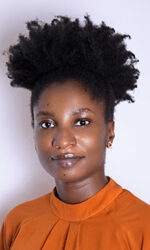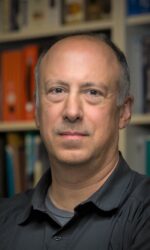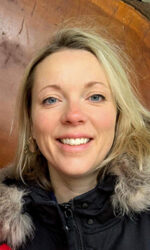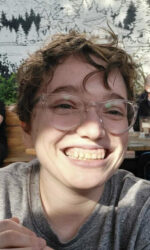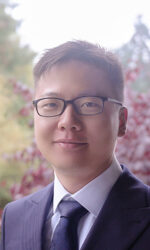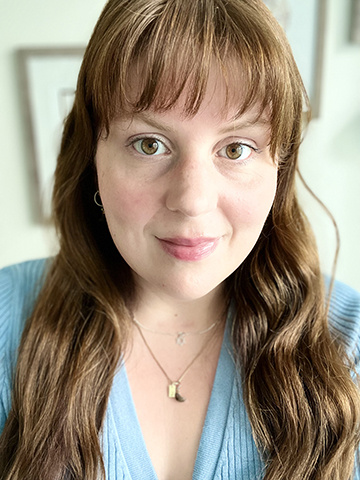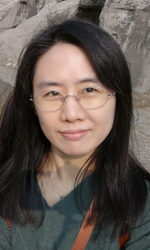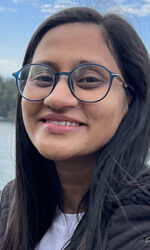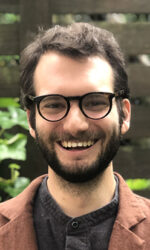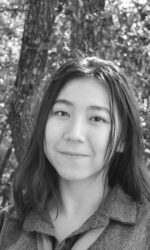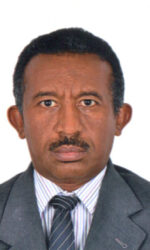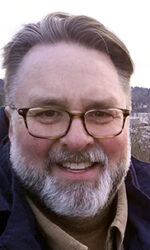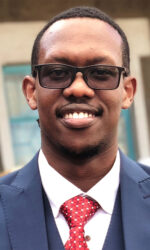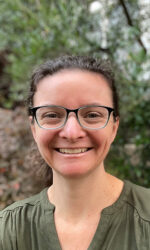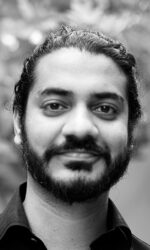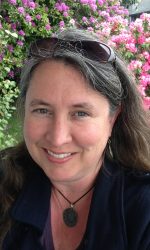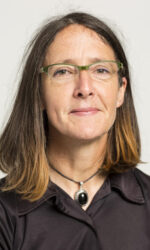Information about current students
Recent Student Honors, Awards, Fellowships
- Abdul-Razak Alidu: 2026 Clean Energy Institute Graduate Fellowship
- Hongfei Li: 2025 Valle Scholarship
- Judy Bowes: 2025 UW Campus Sustainability Award
- Mohammad Tabatabaei Manesh: 2024 Boeing International Fellowship
- Bo Peng: 2023 Chester Fritz Fellowship
- Salman Rashdi: 2023 Chester Fritz Fellowship
- Idris Soliu: 2023 Valle Scholarship
Earlier student honors, awards, fellowships
Daniel D. Akerele
Ph.C., University of Washington (2024)
M.S. Civil Engineering, University of Ibadan, Nigeria (2018)
B.Tech. Civil Engineering, Ladoke Akintola University of Technology, Nigeria (2014)
My research is focused on sustainable construction from the material science standpoint. I am currently researching alternative cements for commercial and infrastructural applications and ultimately to reduce embodied carbon footprint from concrete production. I am also interested in innovative and sustainable materials to solve construction challenges as well as sustainable construction practices.
Eunice Akowuah
Ph.C., University of Washington (2025)
M.S. Real Estate, University of Reading, U.K. (2018)
B.S. Land Economy, Kwame Nkrumah University of Science & Technology, Ghana (2016)
My research interests include housing policy, affordable housing, smart cities, housing markets, real estate markets, appraisals, development, sustainability and investments. Other areas that are of interest to me include facilities management, urban and city planning, and real estate economics.
John Ales
M.S. Real Estate, University of Washington (2019)
M.Arch., Washington University, St. Louis (1997)
B.A. Architectural Studies, University of Washington (1993)
B.S. Building Construction, University of Washington (1993)
I am interested in researching how U.S. housing policies and economics impact housing availability for people of all income levels and social groups and the successful means and methods to deliver more livable and healthy housing for those neglected by the current market-driven system. My additional interests are in production techniques that lower housing costs and increase supply to create healthy housing for people at all income levels with the least impact on the built environment.

Abdul-Razak Alidu
M.S. Construction Management, Kwame Nkrumah University of Science and Technology, Ghana (2024)
B.Sc. Construction Technology and Management, Kwame Nkrumah University of Science and Technology, Ghana (2021)
My research interests span through electrification in transportation, mass production of eco-friendly materials, innovative construction methodologies, and streamlined project delivery processes using green, lean, and six-sigma principles, and digital technologies to reduce environmental impacts and develop new ways of creating sustainable and efficient built environments. I have additional interests in health and safety in construction, circular construction, and risk management.
Helen Beck
Ph.C., University of Washington (2022)
M.S. Housing and Regeneration, London School of Economics (2006)
M.A. Government, University of Manchester (2001)
B. Soc. Sci. Politics, University of Manchester (1998)
My research is focused on the management of public park and recreation services in urban areas. I am particularly interested in the role of the modern green space manager and the way in which our public park services are delivered in the face of extreme poverty. Public parks are on the frontline in our cities responding to complex social and environmental challenges. This role is likely to get more important in the future. Short-term, broken window styles of park management that try to control and sanitize park use are not sustainable. I am exploring the application of an ethic of care to the delivery of park services, what this could entail and how this would change current practice.
Jori Bercier
M. Design for Human Health, Boston Architectural College (2021)
B.S. Arch., University of Louisiana at Lafayette (2017)
How do we measure Queer belonging in place and space?
My research seeks to analyze and understand the nature and prevalence of queer belonging within 3rd places of Seattle.
I will be focusing on materiality, building techniques, and overall community planning to answer this question while using engaging graphic techniques to capture this phenomenon.
Orgil Borjigin
Ph.C., University of Washington (2025)
M.S. Civil Engineering & Management, University of Birmingham, U.K. (2021)
B.Engr., Construction Management, Inner Mongolia University, China (2019)
My research is deeply rooted in the intersection of advanced technology and the construction industry. I am particularly interested in the exploration and application of Building Information Modeling (BIM) and Virtual Design and Construction (VDC). Beyond these technological frontiers, sustainable engineering holds a special place in my academic pursuits. I am dedicated to merging innovative technology with sustainable methods, aiming for a construction industry that is both advanced and environmentally responsible.
Judy Bowes
Ph.C., University of Washington (2025)
M.S. Architecture in History & Theory, University of Washington (2020)
B.A. Arabic Language & Culture, California University of Pennsylvania (2016)
My primary research interest focuses on preventing avian fatalities resulting from collisions with buildings and structures through effective glass, lighting, and landscape design strategies. My broader objective is to demonstrate how these design strategies are integral to sustainable building objectives and avian conservation goals throughout the built environment. I also plan to explore how providing habitat space for birds and protecting wildlife supports visual biodiversity, positively impacting human well-being and the local ecology.
My additional interests include discovering the intersection between biophilic design elements in early Middle Eastern Architecture and sustainable architecture in the contemporary Middle East.
Hyein Chae
M.S. Urban Design, Seoul National University (2012)
B.L.A., Seoul National University (2010)
I have a strong interest in urban conservation, which aims to enhance sustainability in old urban areas physically, economically, and socially. I would like to study management of changes in old (historic) urban areas, specifically focusing on creative approaches such as adaptive reuse projects, contemporary designs, and long-standing communities. In addition, I am also interested in urbanism issues in developing countries in East Asia, international preservation principals, gentrification, public places.
Soonwook Cheong
M. Arch. Studies, Chung-Ang University, Korea (2016)
B.Arch., Chung-Ang University, Korea (2014)
My doctoral research, Adopted Modernism and the Fostered Architecture, examines the relationship between architecture and the state to understand the post-war and post-colonial modern architecture in Korea and to ameliorate the lingering vestiges to secure autonomy and publicness in architecture. The significance of my research is that it analyzes how the political ages influence architecture, reflects upon the role of architecture, and explores future prospects.
Additional interests include global modernism, the architecture of politics and power, and contemporary architectural design policies.
Summer Xuan Dai
Ph.C., University of Washington (2024)
M.A. China Studies, University of Washington (2022)
B.A. Advertising, Communication University of China, China (2010)
My research focuses on urban civic space in contemporary China from social, cultural, and political perspectives. Currently, I am exploring the transformation of physical bookstores as public spaces in Chinese cities from the early 20th century to the present and its driving forces.
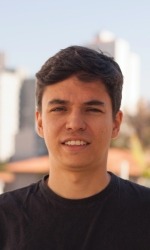
Lucas Damiani Barreto
M.S. Architecture and Urbanism, Universidade Presbiteriana Mackenzie, Brazil (2023)
B.Arch. Architecture and Urbanism, Universidade Presbiteriana Mackenzie, Brazil (2018)
I want to focus on the history of modern Brazilian architecture, based on a commercial architectural publication circulated from 1938 to 1971 called Revista Acrópole (Acropolis magazine in English). The 390 issues digitalized in 2014 have never been studied as a whole body of knowledge regarding projects, texts, advertisements, graphic design, etc. Research into this publication has the potential to provide fresh insights into this pivotal period of Brazilian architectural production while also contributing to the discussion of the global history of modernism. My proposed research relates to the intersection of history, theory, design, and representation in the contest of regional and global history. I am also interested in postcolonial theory and the relationship between architecture and politics, especially in the period of Brazilian dictatorship.
Nicholas de Vry
M.S. Arch History/Theory, University of Washington (2023)
B.A. Anthropology, University of Washington (2017)
I am interested in investigating the day-to-day values and reasons local communities value historic structures that are otherwise not accounted for by orthodox historic preservation policy and theory. Why do communities care for historic structures? What uses do they value in historic structures? Do these values get changed through adaptive reuse or redevelopment, or over time? I have additional interests in historic preservation practice, archaeology, anthropology, and qualitative research.
Ph.C., University of Washington (2024)
M.S. Construction & Project Management, Queens University of Belfast, U.K. (2019)
B.Arch., Bharati Vidyapeeth Deemed University, India (2017)
My research interests extensively include the story of logistics and supply chain management in the construction industry, project delivery systems procurement ways, and contract administration which aims to deliver high quality projects and energy efficiency for a resilient future. I also want to research BIM and project management software to ensure what is being delivered and what is the real value that aligns with the organization’s goals, and to learn comprehensively about contracts and modes of procurement for effective project management and to avoid disputes. I also aim to develop a holistic approach to the planning, monitoring and control of construction projects by integrating the technical knowledge of design, engineering and construction with financial, legal, IT, commercial leadership and managerial skills. I have additional interests in sustainable supply chain management, lean construction, project scheduling, planning and project delivery for sustainable built environments.
Matt Grosser
M.L.A., University of Washington (2020)
B.S. Sustainable Urban Environments, New York University (2015)
My doctoral research is centered around how ecologically based infrastructural adaptation strategies can serve as a mechanism for combating the impacts of climate change. I’m specifically interested in the role that critical ecosystems and keystone species can play in resilience/adaptation design and planning. My work investigates how traditional and emerging ecologically based infrastructural techniques could be improved and more broadly applied, as well as how the resultant socio-ecological bonds formed by the implementation of these strategies could elevate the role of ecological systems thinking for design and planning practices within the built environment. Additionally, I am interested in all matters of resilience/adaptation at the water’s edge—managed retreat, hazard mitigation, coastal/ecological modeling, parametric design for ecology, social-ecological entanglements and the value of visible ecologies.
Babita Joy
Ph.C., University of Washington (2020)
M.S. Arch. History/Theory, University of Washington (2018)
M.Arch., Illinois Institute of Technology (2009)
B.Arch., Visvesvaraya Technological University, India (2006)
I plan to examine the intersections of architectural practice and theory, specifically, the interweaving of structural and material compositions with theoretical frameworks. My research focuses on the architecture of modern/contemporary cultural spaces being shaped by influences of technology, interdisciplinary dialogue, culture, and urbanism. I have additional interests in materiality, complexity theory, minimalism, construction history, and transnational and global architects/architecture.
Hongfei Li
Ph.C., University of Washington (2024)
M.L.A., Rhode Island School of Design (2018)
B.Engr. Landscape Architecture, South China University of Technology, China (2016)
I research our perceptual and embodied experiences of places. I investigate this topic via: (1) the material and immaterial qualities of landscape architecture and how the geometrical space registers these elements dynamically through time; (2) interdisciplinary theories that acknowledge bodily relations with space, including phenomenology, environmental psychology, embodiment and affordance in cognitive psychology, enactive architectural experience in neuroscience, and conciseness of place in East Asian aesthetics. For more information, see hongfei-li.com.
Yingjie Liu
M.S. Advanced Arch., Columbia University (2022)
B.Arch., Beijing Jiaotong University, China (2020)
My interest lies in urban-scale building energy modeling and carbon accounting for climate mitigation. Specifically, I am focused on how digital documentation of the built environment can automate and enhance the accuracy of current accounting methods. Moreover, I am intrigued by how these advancements enable the broader application of bottom-up accounting approaches, informing early-stage design and influencing energy policy decisions.

Zhongmin Evy Luo
M.P.A. International Development, Indiana University Bloomington (2022)
B. Law International Politics, Xi’an International Studies University, China (2020)
Housing is a fundamental human right and an issue of social justice. Having worked at the local housing authority, I am deeply concerned about the housing challenges faced by individuals and strive to assist those in need of housing. As a Ph.D. student, I focus on researching housing affordability in urban areas and advocate for a community-oriented approach to addressing these issues.
Karen May
Certificate in Applied Digital Geography / GIS, TMU, Canada (ongoing)
M.L.A., University of Toronto, Canada (2011)
B.A. Political Science, University of Toronto, Canada (2007)
Certificate in Fine / Studio Art, Sheridan College, Oakville, Canada (2002)
My research interests center around questions of how community-based knowledge, place-based identity, and environmental narrative can be explored and amplified through community-engaged design and planning for large scale environmental change. I am keen to explore how traditional landscape representation methods and non-traditional methods like of participatory mapping and collaborative drawing, in combination with ethnographic fieldwork practices of encountering, witnessing, and documenting, can be employed towards a theory of relational design. I see the interdisciplinary nature of landscape scholarship as an opportunity to explore a course of research in both novel modes of representation and emergent discourse around the designer as activist and advocate.
Additional interests include: 1) the science and politics of ecological restoration and health, traditional ecological knowledge and the potential to build alliances with indigenous communities around land-based practices of care and kinship; 2) environmental and climate justice, just-transition, and engagement with critical perspectives on green washing, eco-gentrification, and the socio-economic legacy of landscape urbanism; 3) graphic novels and comics-based-research as form of inquiry using visual storytelling to explore complex landscape phenomena and relationships.
Mohammed G.S. Mohamed
M.S. Construction Management, University of Washington (2021)
B. Law, Cairo University, Egypt (2014)
M.B.A., Admadu Bello University, Nigeria (2000)
M.S. Arch, Ahmadu Bello University, Nigeria (1999)
B.S. Arch., Ahmadu Bello University, Nigeria (1997)
Dip. Arch., Sudan University of Science & Technology, Sudan (1991)
B.S. Mechanical Engineering, University of Khartoum, Sudan (1990)
My research interests are in lean construction principles with a focus on lean project delivery systems, offsite and prefabrication construction, construction supply chain networks, and target value design. In addition to that my interests include life cycle project economics and modeling, building economic and quantitative risk analysis, a public-private partnership for projects, value engineering and management, and new technologies in construction.
Christopher Monson
Ph.C., University of Washington (2015)
M.Arch. (with distinction), Harvard University (1993)
B.Arch., University of Minnesota, Minneapolis (1987)
My research interests focus on the contemporary problems of integrated architecture, engineering, and construction practices, particularly the communication processes and team workflows that support them. This work is at the intersection of AEC and the sociological and organizational theories that help identify and analyze the activities within professional practice collaboration. I am using qualitative studies to build theory and practice models for Lean Construction, sustainable design and construction, and integration across design, construction, and facility management. I am also working with technological constructs like BIM and COBie that form foundations for new kinds of collaboration.
I am a licensed architect, and have been a long-time educator in architecture and construction. I have taught design and construction studios, building detailing and assemblages, and architectural theory, and have been recognized institutionally and nationally for teaching excellence. My instructional research is focused on studio-based learning and design thinking.
Kevin Muiruri
Ph.C., University of Washington (2025)
M.S. Construction Management, University of Washington (2022)
B.S. Civil Engineering, Dedan Kimathi University of Technology, Kenya (2017)
I have an interest in project delivery methods and their impact to project success. I also have an interest in project control and construction contracts. Privatization in construction and private-public partnerships is another area of interest. Additional interests: project cost management, sustainability.
Michael Olney
M.S. History and Theory of Architecture, UW (2024)
M.Arch., UW (2019)
B.A. Environmental Studies: Urban Planning and Environmental Policy, Western Washington University (2011)
My primary research interest is in representational theory and history focusing on the intersection between conceptualization and representation. All the ways that designers use representation to think through the design process in the built environment. I want to explore methods of using representation to reconceptualize the challenges that we face in the present and future. How we conceive of the challenges that we face impacts the way we try to solve them and representation can help us reconceptualize everything from inequity to sustainability.
Global history of the built environment (particularly in the Mediterranean, Middle East and Japan), studio pedagogy, critical cartography, data visualization in the built environment and the history of critical regionalism.
Ph.C., University of Washington (2023)
M.A. Conservation Studies, Historic Buildings, University of York, United Kingdom (2016)
M.S. Architecture, California Polytechnic State University (2008)
B.S. Architectural Engineering, California Polytechnic State University (2008)
I am interested in exploring the development of historic structural systems. I plan on researching a historic development in structural engineering and construction, exploring the history, including the introduction and implementation of the system, balancing a historic narrative with a technical engineering exploration, as well as considerations for modern construction – in both new and preservation contexts. I am particularly interested in focusing my research on the development of the West Coast and Pacific Northwest. I am a structural engineer and am also interested in structural engineering topics, including teaching and the history of the structural engineering field, as well as broader topics related to the history of construction and building technologies, historic preservation, and sustainable design.
Salman Rashdi
Ph.C., University of Washington (2003)
M.A. Architectural History, University of Virginia (2021)
B.Arch., Indus Valley School of Art & Architecture, Pakistan (2018)
My general research interests focus on architectural production in post-colonial societies. I started my research in my Masters with a study of architecture in Pakistan after independence and how simultaneous tensions and fusions between ideals of nationalism and religion have influenced the production of architecture in the country. Through this study I am also focusing on expressions of national identity through architectural form and space and the role that a 20th century expression of Islamic architecture has played in the formation of a post-colonial nation state. In my PhD I hope to expand this inquiry to the larger South-Asian region and/or the Post-colonial Muslim world.

Alvina Ekua Ntefua Saah
M.S. Civil Engineering, Dong-A University, South Korea (2023)
B.S. Quantity Surveying and Construction Economics, Kwame Nkrumah University of Science and Technology, Ghana (2013)
My research is centered on sustainability in the built environment, with a focus on climate mitigation through the decarbonization of existing buildings using retrofit processes. I am exploring how to integrate future climate change scenarios and Construction Hazard Prevention through Design (CHPtD) to enhance safety and sustainability from the earliest stages of building decarbonization retrofit projects.
Additionally, I am investigating how cutting-edge technologies, including digital tools and smart systems, can drive more efficient, sustainable, and resilient retrofit strategies. By integrating eco-friendly practices and leveraging technology, my goal is to contribute to the creation of sustainable and safe buildings that address the urgent challenges of climate change.

Idris Soliu
Ph.C., University of Washington (2024)
M.Tech. Construction Economics, Federal University of Technology Akure, Nigeria (2021)
B.Tech. Quantitative Surveying, Federal University of Technology Minna, Nigeria (2014)
My research interests focus on the intersection of Circular Economy, Sustainability, and Digital Technology, specifically implementing a circular economy across the construction value chain (micro, meso, and macro levels) to achieve a circularized built environment. Other areas of interest include project delivery methods, cost estimation, and digitization in the construction industry.

Mohammad Tabatabaei Manesh
M. Energy & Arch, University of Tehran, Iran (2023)
B.Arch., Art University of Esfahan, Iran (2020)
I am a building science researcher specializing in data science and computational methods. My work focuses on developing data-driven approaches to optimize multi-objective building components aimed at reducing carbon emissions in the Architecture, Engineering, and Construction (AEC) industry. I am particularly interested in applying artificial intelligence to enhance building performance and exploring the design of acoustic metamaterials to improve building acoustics and sustainability.
Muhammad Abu Bakar Tariq
M.S. Construction Project Management, The University of Manchester, U.K. (2014)
B.Sc. Civil Engineering, University of Engineering and Technology – Taxila, Pakistan (2011)
My research interests include developing resilient and sustainable built environments through technology, for instance, Building Information Modelling (BIM) along with emerging technologies and their holistic applications across the entire life-cycle of construction projects for sustainable development. Another area of interest is Artificial Intelligence (AI), which is a disruptive technology, thus the construction industry is no exception. I intend to examine how the construction sector can adopt this emerging technology by adapting to AI and AI-Assisted BIM.
Ph.C., University of Washington (2015)
M.S. Architectural History/Theory, University of Washington (2013)
B.A. Anthropology, University of Washington (2002)
My research focuses on historic preservation theory and practice, particularly related to vernacular buildings and cultural landscapes. Specifically, I am interested in understanding how the intellectual framework that underlies public policy can better support the preservation of community gathering places and other historic sites that are significant for their contemporary cultural uses, social values, and roles in traditional economies. For more information about my research, please see “Recognizing the Contemporary Cultural Significance of Historic Places: A Proposal to Amend National Register Criteria to Include Social Value” on the US/ICOMOS site. In addition to pursuing doctoral research, I am the owner and principal of Past Forward Northwest Cultural Services, a consulting business specializing in historic preservation research and heritage education projects.
Elizabeth A. Umbanhowar
Ph.C., University of Washington (2020)
M.L.A., University of Washington (2007)
B.A. English, Carleton College (1989)
Through my studies, I am undertaking a critical investigation of the historic and future role of digital visual culture and technology in mediating, navigating and shaping personal and social cognition and connectivity in our contemporary urbanscapes. While design professions are actively adopting new digital technologies into the classroom and workplace, there has been less research on the role of mobile technologies and Virtual and Augmented Reality on user/stakeholder experience. I am collaborating with allied disciplines to establish methods to evaluate and potentially develop digital mobile technologies that will measure and enhance experience, engagement and connection to outdoor or public places. Ultimately I am interested in: how the use of and access to evolving digital mobile technologies effect human health and well-being; what are impacts on individual and collective rights to occupy, define, and participate in public places; and what are the implications for the teaching and practice of landscape architecture?
Jerry Watson
Ph.C., University of Washington
M.L.A., University of Washington
B.A. Asian Design, University of Washington
My research focuses on the phenomena of combat-related trauma, and endeavors to identify, analyze and disclose the historical, physiological and psychological effects of said trauma, incorporating some of the current philosophical, theoretical and psychological literature on the tragedy and terror inflicted by humans upon each other under the guise of nationalized hegemony. I seek to articulate a new paradigm. Identifying space and place in the natural world where groups of people can gather to share their essential narratives, aggregated stories, and recognize the inherent struggle in their pilgrimage to find a safe space in which to recover from the horror and inhumanity of war and the memories of said events that have often defined their lives.
Tera Williams
M. Design Studies, Boston Architectural College (2018)
B.A. interdisciplinary Studies/Architecture, Evergreen State College (2012)
I am interested in researching equitable revitalization methods in marginalized communities so those communities can be revitalized without creating mass displacement and erasure of the existing culture. I have been using environmental psychology as a lens to analyze the neighborhood and explain the existing value there to people who do not inherently see it. I am interested in delving into how design can be used as a tool to empower communities to strive for spatial justice. I have additional interests in culture, place, identity, collectivism, belonging, community, equitable community development, human well-being, affordable housing, economic empowerment, and interdependence.
Sean Xianxiang Zhao
M.S. Construction Management, University of Washington (2022)
B.Engr., Jilinjianzhu University, China (2020)
My research interests lie in the study of constraints in real-world construction supply chain with the help of emerging technologies. I believe that with the increasing level of standardization in construction, automation will have an extraordinary effect on the construction supply chain. At the same time, I am also interested in construction simulation and data-driven decision-making.
Earlier student honors, awards, fellowships
- Yue Liu: 2018 Robert E. Thunen Memorial Scholarship, Microsoft Azure Research Award, and Richard Kelly Grant
- Yue Liu: Best paper, 2018 Building Performance Analysis Conference
- Adnya Sarasmita: 2018 Chester Fritz Fellowship
- Holly Taylor: 2017 The National Archives of Australia and the Australian Historical Association Research Scholarship
- Shannon K. Tyman: 2017–2018 and 2016–2017 Project for Interdisciplinary Pedagogy (PIP) Fellowship
- Leann Andrews: 2016–2017 Fogarty International Clinical Research Fellowship
- Barbara Rodriguez Droguett: 2015 Beca Chile CONICYT Government of Chile Scholarship
- Daniel E. Coslett: 2014 CEMAT Research Grant (Centre d’Etudes Maghrébines à Tunis) dissertation research grant, Tunisia and Algeria
- Julie Kriegh: 2014 AIA Upjohn Initiative Research Award—People + Energy + Place: Understanding Behavior in High Performance Buildings and Communities
- Daniel E. Coslett: 2013 Ottenberg-Winans-Honors Fellowship (University of Washington African Studies Program), dissertation research grant
- Julie Kriegh: 2013 AIA Upjohn Initiative Research Award—Tenant Engagement in High Performance Buildings and Communities
- Amber Trout: 2013–2014 AAAS Emerging Leaders in Science and Society Fellowship
- Shu-Mei Huang: 2011–2012 Dissertation Fellowship, Chiang Ching-kuo Foundation for International Scholarly Exchange
- Chiaoyen Yang: 2011–2012 Dissertation Fellowship, Chiang Ching-kuo Foundation for International Scholarly Exchange
- Chiaoyen Yang: 2011 Chester Fritz Endowment Fellow
- Ozge Sade: 2009–2010 Fellow, Koç University Research Center for Anatolian Civilizations
- Kuei-Hsien Liao: 2009–2011 Scholarship, Taiwan Ministry of Education
- Chiaoyen Yang: 2008–2010 Scholarship, Taiwan Ministry of Education
- Shu-Mei Huang: 2008–2010 Scholarship, Taiwan Ministry of Education
- Meriwether Wilson: 2008–2010 Honorary Fellow, University of Edinburgh, School of GeoSciences
- Kuang-Ting Huang: 2008–2009 China Studies Program Fellowship
- Paula Patterson: 2008–2009 American-Scandinavian Foundation dissertation research fellowship
- Jayde Lin Roberts: 2008–2009 Fulbright-Hays Doctoral Dissertation Research Abroad fellowship
- Jayde Lin Roberts: 2008–2009 Gething Travel Award
- Kuei-Hsien Liao: 2007–2008 Chester Fritz Endowment Fellow
- Ashish Nangia: 2007–2008 Research Cluster funding from Simpson Center for the Humanities
- Eric Noll: 2007 Public Humanities for Doctoral Students Fellowship
- Ashish Nangia: 2006–2007 India Association of Western Washington South Asian Studies Scholarship
- Paula Patterson: 2006–2007 Valle Scholarship, Finland
- Jayde Lin Roberts: 2006–2007 Blakemore Freeman Fellowships for Advanced Asian Language Study
- Paula Patterson: 2005–2006 FLAS Fellowship for French
- Meriwether Wilson: 2005–2006 Henry Luce Fellowship
- Paula Patterson: Summer 2005, FLAS Fellowship for Finnish
- Jayde Lin Roberts: 2004–2005 FLAS Fellowship for Hindi
- Paula Patterson: 2004, Kate Neal Kinley Memorial
- Ken Camarata: 2003–2005 Gerberding Fellowship
- Ken Yocom: 2002–2006 National Science Foundation Integrative Graduate Education and Research Traineeship (IGERT) Fellowship
Questions about the PhD in the Built Environment? Email bephd@uw.edu.

